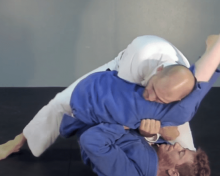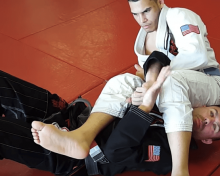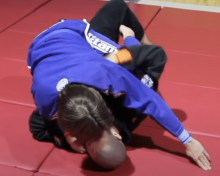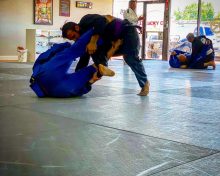103 N Broadway St, Poteau, OK 74953, United States
Address & Contact
Our Address
103 N Broadway St, Poteau, OK 74953, United States
GPS
35.0544304, -94.62350769999999
103 N Broadway St, Poteau, OK 74953, United States
103 N Broadway St, Poteau, OK 74953, United States
35.0544304, -94.62350769999999

Armbar Defense The best defense against an armbar from closed guard is one of the basic moves that all practitioners need to be aware of; the position of your arms and your head. Armbar: A joint lock where the elbow is hyperextended in order to cause pain and/or injury. Things that you need to be aware of: Posture, you can play the safes way, which is a straight posture having your head away from your opponent guard, or the last resource is when the posture is broken, then your head needs to be against the chest/side of your opponent. Arms, your arms should be on your partner’s belly or holding your opponent’s arms. Try to avoid placing your hands on the mat; this can cause your opponent to look for other submissions. Defend the Armbar Don’t allow your opponent to cross your elbow to his waist or even worst to the middle or pass his belly line. When your elbow gets compromised, and your opponent throws his leg over your head, you can quickly with the free arm ‘hug’ under your arm, holding his leg to prevent the exposed arm from being hyperextended. You can also avoid this by stopping […]

Defending an armbar is a crucial skill we BJJ practitioners need to learn or know what makes it so effective as a submission tool. The armbar from mount is a difficult place to be when defending the submission. Usually, your opponent is in full mount and then transition to S mount to armbar; that is where we’ll start the escape. Armbar: A joint lock where the elbow is hyperextended in order to cause pain and/or injury. When you are defending the armbar from the mount position, you’ll need to calm and trust the technique, things can happen very fast, and you can get submitted. Things to keep in mind when you are defending the armbar: Hold your exposed arm by griping your hands; ball and socket grip, gable grip, S grip, or the RNC type of grip; you can always grab the fabric of your Gi jacket. This is a crucial time to buy out time before the escape. Be aware of your opponent’s position; does your opponent have a secure armbar? Is he/she is bitting with the heels against you? is your opponent crossed his feet or not? Your opponent’s chest is close to your trapped arm? All these […]

Bridge and Roll is one of the most basic movements in BJJ, and you’ll learn this very quickly in your Jiu-Jitsu journey. Bridge and Roll are two words that can mean many things outside the BJJ community but is part of the lingo in the suave-art. Knowing the details of how to Bridge and Roll is the key to a good escape as part of your defense toolkit. First of all, the mechanics of the movements; Bridge. Bridging is the action where you lift your hips while you keep your heels close to your butt; usually, you will redirect your movement to the left/right of your center, to the 1 or 11 on the clock position. The movement is so common that it can be part of your warmup, making an explosion movement to either remove an opponent from on top of you or basically gain a better position. Roll. The rolling part is usually a continuation of another move. Rolling is what it means, roll yourself or with an opponent from one position to another, left or right. The two movements are a potent duo. Let’s explore one of its applications; Bridge and Roll when an opponent is in […]

Guard Retention is, like the name suggests, retain the guard position. There are a few ways to approach this concept of guard retention. The basics are that we need to understand our opponent’s position and ours; you want to retain your guard while your opponent is trying to pass your guard. The guard is a ground grappling position in which one combatant has their back to the ground while attempting to control the other combatant using their legs. In pure grappling combat sports, the guard is considered an advantageous position, because the bottom combatant can attack with various joint locks and chokeholds, while the top combatant’s priority is the transition into a more dominant position, a process known as passing the guard Consider this: Framing. There are several lines of thought about the ‘frame’ while you are on guard. One of them is when your knees connect with your elbows forming a rhombus. By connecting the elbows with the knees (the rhombus frame), we allow our legs not to stick too far out. Movement. While keeping a good framing position, our opponent’s motive will be passing our guard by pinning our knee to the mat or moving it to the opposite side. The upper body should follow the lower body; if one knee […]

Comments 0